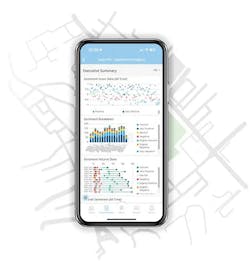The loudest voices are oftentimes the ones that are heard. To law enforcement’s detriment, this has led to social media pages of departments to be filled with negative comments, posted by people who don’t even live in their jurisdiction. But how do agencies highlight their positive interaction with the public while also collecting data to further determine what the best strategies are in the different areas their officers patrol?
This article appeared in the July/August issue of OFFICER Magazine. Click Here to subscribe to OFFICER Magazine.
Axon’s My90 platform gives law enforcement agencies the ability to automatically send 911 callers short surveys about their interactions with officers, engage community members through surveys that can be shared at events or on social media and the ability to distribute anonymous surveys to officers to reduce burnout and support health and wellness initiatives.
During Axon Week in Miami Beach, Florida this spring, Axon Product Manager Ian Kapets, Axon Principal Customer Success Executive Chris Chew, Virginia Beach Police Deputy Chief William Zelms and Pittsburgh Bureau of Police Assistant Chief Christopher Ragland spoke during a session about My90’s success stories and how, when done correctly, surveys can provide law enforcement agencies with the data they need.
The need for data
For the general public, surveys are in no way a new thing, but Kapets stresses that My90 strives to make them worthwhile. “We get them when shopping at Target, whether you go to pick up gas or sign up for a flight; you get them for everything,” he says. “That’s something that we’ve really worked with a lot of our agencies on. How do we make this be actionable? If I ask a question like ‘Hey, did you like getting a citation?’ I think 99.9% of time, you’re getting resounding “Nos.’ No one likes getting pulled over. No one likes enforcement action, but if we can frame those questions and frame the feedback that we’re getting in a way that’s objective, but it’s also actionable for leaders to drive best practices and good outcomes. I think that’s where we can start differentiating ourselves. We can really say in law enforcement that we’re constantly looking to be better.”
Chew, who retired from the Evesham Police Department in New Jersey as police chief in 2022, says that the data collected by the surveys can be critical for administrators. “I was a very proactive police chief. I was always in the community, almost every single night. Whether we’re hosting Coffee With a Cop, Pizza With Police, whatever it was, what I constantly and consistently heard was ‘I love your officers. You’re doing a great job. You need more officers.’ But I never had the ability to capture that data so I could go to the mayor and council on my budget and say, ‘This is what the community says.’ So, it was more like, ‘You’re just asking for more officers. You want more of a budget.’ I heard the same story every year. We have the ability now to collect that data and you have the ability to break down how many positive results you’re getting.”
He says My90 is even more important for accredited agencies, whether it’s through CALEA or a state accreditation. “This is going to be a key component to maintain that certification. I was flying in the dark trying to collect this data. I’d put multiple Survey Monkey surveys up quarterly and I’d be getting responses from somebody in Ontario, Canada, saying ‘I can’t stand your police department,’ and that’s skewed the numbers. With My90, you now have the ability to exceed standards and show factually this is what the community’s expectations are, and this is what they really think of the services officers are providing.”
This data can be used tell a story and frame a narrative, which Chew says can be vital for a police chief. “The success stories that I’m hearing from my customers now that I’m on Axon’s team is nothing but positive results from the internal surveys to the outside-facing, the immediate questions that you know you’re sending out and then the responses you’re getting are back. You’re shaping the communication and who you are as an agency based off of factual data that you’re bringing in from the public.”
Zelms described My90 as a “game changer” in terms of being able to build trust and legitimacy within communities with the data being used during various presentations to civic groups, community leaders and associations as well as elected officials and city leadership. “In Virginia Beach, we have undergone a kind of data transformation, and My90 has really enabled us to put forth the good sentiment within our community and show—despite some narratives that might be going on across the country—what the people, the residents, the visitors who are actually calling and utilizing our services think about our officers.”
Before implementing My90, Virginia Beach’s process for deploying surveys was less than ideal. “We used to undergo the least efficient, most laborious community surveys possible,” says Zelms. “We would ask our analysts to filter out and segment different areas of our city to go in, then we would knock door-to-door asking pre-planned questions. It’s typically done in August, when it’s hot and officers are sweating. It was done in the evening, so people are just trying to sit down for dinner, and they’re not really in in in the mindset to give us any valuable information, and they’re wondering what the police are doing, showing up at their door as we’re asking them these questions in order to try to gauge how we’re doing in the community.”
The process wasn’t effective, and made it difficult to quantify how the community perceives the service of the officers. “With My90, this information that is generated when we go through by call types and choose which calls we want the caller to receive a survey. We are instantaneously getting feedback and it’s quantifying the overwhelming positive sentiment within our community of our police department,” he says. “I think when you can go in front of your elected officials and say that from the people who receive your services, in our case, we have an 83% overall positive sentiment among those who receive our services. That quantitative data is extremely valuable, especially when we’re talking about budgets and requests for resources and more community initiatives. It’s really transformed the way that we’ve been able to manage, message and then access additional services that are valuable to our community."
Getting buy-in
When Ragland wanted to pilot the My90 program, he initially had a lot of pushback from his officers. He recalls an officer telling him, “Boss, this isn’t going to work. People don’t like us. I think you’re going to find out very quickly that the community is against us.” He responded, “Let’s give it a shot and we’ll see what the results bring.”
The initiative was launched in his patrol zone, which is about 14 neighborhoods and is about nine square miles. His staff took about 17 different call categories and sent out the surveys to individuals. The Pittsburgh Bureau of Police hadn’t previously deployed surveys in the past, so Ragland wasn’t sure what to expect. The officer who had told him it wouldn’t work was mentioned by name in one of the surveys. The respondent wrote: “That guy really did perform well. He was very professional.” The assistant chief was excited to show the officer his feedback and called him into his office. “He thinks he’s in trouble and I sit down and I said, ‘Hey, look.’ He looks at the survey, and you could tell the light bulb went off in his head and he recognized immediately how valuable that type of feedback is.”
Zelms echoed Ragland’s experience in trying to get buy-in from his officers. “It’s not unlike any new policy, new technology or implementation of any process that’s changed. We always want to get the feedback and buy-in of the people who it’s going to impact the most,” he says. “The interesting thing with My90 is it was so new, and the first inclination I think it brought out in folks was, ‘So, we’re going to get like a Yelp rating now on our services?’ No, that’s not it, that’s not what we’re doing, they would be told. In Virginia Beach, what we’ve done is we’ve anonymized the officer. So, when leadership receives the feedback, it is completely sanitized of who the officer was responding, so it’s not a rating on an individual case.”
When a respondent goes out of their way to mention the name of an officer in the free text field in a positive way, the department’s command staff goes out of its way to recognize those officers for a job well done. “We want to make sure that they know that their work is valued and the community appreciates their service,” he says. “Even though it’s anonymous, we go out of our way to recognize when they do it good. That is an important part of the feedback loop.”
Zelms stresses that the Virginia Beach Police Department isn’t using My90 for civilians to file complaints, which Ragland says is also the case in Pittsburgh. “We’re on the same page. When we get these surveys back, they can say just about anything, but we don’t utilize those to start a complaint. We have a very methodical complaint process. On our website, there’s any number of ways you can file those complaints.”
Chew says the data brought in by My90 is critical for departments. “You’re seeing officers names in the surveys that they are doing a great job. So, internally, the morale goes up within the agency. This was a missing critical piece that I did not have when I was chief until Axon partnered with My90,” he says. “When you get that data of an officer’s name for a call for service, you can use it during performance evaluations, which don’t always have a lot of value. When you are able to document the officer did a great job, they feel appreciated. Then, when that officer comes for specialized assignments or promotions, you actually have data that you’re making those decisions based on.”
About the Author
Paul Peluso
Editor
Paul Peluso is the Managing Editor of OFFICER Magazine and has been with the Officer Media Group since 2006. He began as an Associate Editor, writing and editing content for Officer.com. Previously, Paul worked as a reporter for several newspapers in the suburbs of Baltimore, MD.



